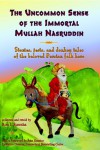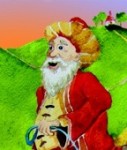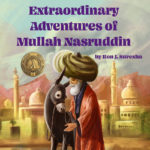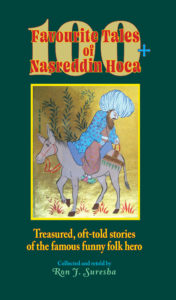Peace Follows Renunciation?

 A gnarly band of bandits came upon an abandoned monastery in the countryside and decided to inhabit the place. Hoping to cash in on the Sufi reputation as respected teachers of immense insight, they put on stolen white tablecloths, intending to pose as dervishes in order to catch, confuse, and rob hapless travelers. The group began to beat a rhythmic dirge that was sure to catch the attention of some hapless sucker.
A gnarly band of bandits came upon an abandoned monastery in the countryside and decided to inhabit the place. Hoping to cash in on the Sufi reputation as respected teachers of immense insight, they put on stolen white tablecloths, intending to pose as dervishes in order to catch, confuse, and rob hapless travelers. The group began to beat a rhythmic dirge that was sure to catch the attention of some hapless sucker.
As it so happened, the Mullah and his son were traveling in the countryside at that time and came across the converted dervish retreat center. Nasruddin told his son, “Look, night will be falling soon, and this appears to be a highly advanced sect. Let us ask for their hospitality and stay the night.” The pseudo-monks in their white outfits welcomed them in and immediately began the evening service, which seemed to entail mostly of jumping and spinning around in a circle while chanting these words. The fake dervishes encouraged him to participate, so Mullah handed over the rein of his little grey donkey to his son and began to jump and spin about and sing along with their peculiar chant.
The dervish impersonators intoned, “I surrender all attachment to everything!”
The Mullah obediently repeated the words as he gyrated, “I surrender all attachment to everything!”
Next they chanted, “I forsake all desire for physical possession of anything!”
The Mullah repeated as he spun around, “I forsake all desire for physical possession of anything!”
The fake monks then shouted, “I renounce my addiction to the illusion of ownership!”
The Mullah breathlessly and obediently repeated the words, “I renounce my addiction to the illusion of ownership!” louder and louder, as he whirled round and around.
The false dervishes then began chanting faster, “I give away my saddlebag and little grey donkey!”
The Mullah obediently repeated the words, “I give away my saddlebag and little grey donkey!” as he turned, faster and faster as the tempo increased, until finally he was spinning and shrieking at such a hysterical frenzy that he fainted and passed out on the floor.
When Nasruddin finally came to in the morning, his saddlebag and little grey donkey — and the dervishes — were nowhere in sight. The Mullah awoke his son and started to cuff him, saying, “What did you do, you little fool? You were left in charge of the animal!”
“But Father,” said Ahmet, “when one of the dervishes came and led away the donkey, I ran to you, and you kept saying, “I give away my donkey and saddlebag,” so often and with such fervor and in front of so many witnesses that I understood that you meant to give them away.”
Excerpted from The Uncommon Sense of the Immortal Mullah Nasruddin: Stories, Jests, and Donkey Tales of the Beloved Persian Folk Hero
 Your Daily Nasruddin
Your Daily Nasruddin 
Like Nasreddin in this story, so often we fervently spin our hopes for a better tomorrow into a fantasy of unrealistic expectations, which just confuses us all the more, until finally we collapse in a heap on the floor, helpless to defend ourselves against those who would take our livelihood away from us (the donkey and saddle), while our children watch on in silence.





Predicting a Contrarian
Predicting a Contrarian
Excerpted from The Uncommon Sense of the Immortal Mullah Nasruddin: Stories, Jests, and Donkey Tales of the Beloved Persian Folk Hero
Nasruddin’s contrary nature guides him in understanding his mother-in-law’s behavior. In some versions of the story, Nasruddin is called on to rescue his wife (for which the mother-in-law serves as surrogate).